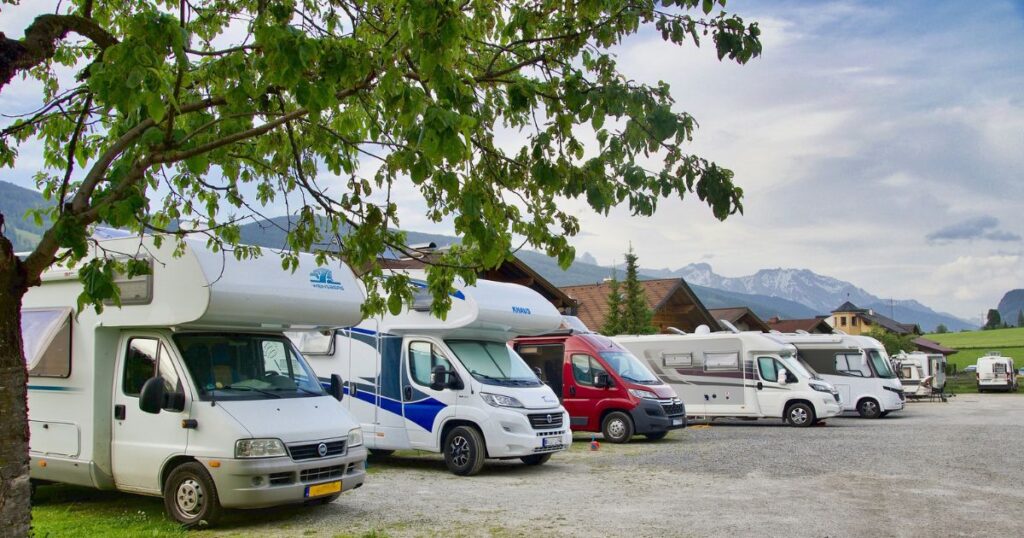Owning a motorhome provides the freedom to explore, but just like any other vehicle, it requires regular maintenance and legal checks. One essential requirement is the motorhome MOT, which ensures your vehicle is safe and roadworthy. We’ll cover everything you need to know about getting an MOT for your motorhome, including requirements, costs, exemptions, and tips to pass the test.
Motorhome insurance
If you need a full motorhome insurance policy, you can get a full quote online in minutes with us. Just click the button below.
What is a motorhome MOT?
An MOT for a motorhome is a legally required test that checks the safety, emissions, and roadworthiness of your vehicle. The test is similar to a standard car MOT but includes checks specific to larger vehicles.
Motorhomes fall into different weight categories, which affect where and how they need to be tested:
- Class 4 MOT – For motorhomes up to 3,000kg.
- Class 7 MOT – For motorhomes between 3,000kg and 3,500kg.
- HGV MOT – Required for motorhomes over 3,500kg.
You can check the MOT status and MOT history for any vehicle on the GOV.UK website.
When does your motorhome need an MOT?
If your motorhome is over three years old, you must book an MOT annually. The test must be conducted before your current MOT expires to ensure you remain legally compliant and avoid fines.
You can check your MOT due date online using the government’s official MOT history checker.
What does a motorhome MOT check?
MOT tests for motorhomes cover many of the same aspects as a car MOT, such as brakes, tyres, lights, and emissions. However, due to their size and weight, motorhomes may have additional checks to ensure structural integrity and load-bearing components meet safety standards.
A motorhome MOT test includes checks on:
- Brakes and suspension – Ensuring they function correctly and meet safety standards.
- Tyres and wheels – Checking tread depth and condition.
- Lights and electrical systems – Verifying all lights are working correctly.
- Bodywork and structure – Looking for corrosion or structural damage.
- Steering and visibility – Ensuring controls operate smoothly and mirrors provide a clear view.
- Emissions – Measuring exhaust emissions to meet environmental regulations.
Where can you get an MOT test for motorhomes?
Not all MOT test centres can accommodate motorhomes, especially larger models. You may need to visit a specialist garage equipped to handle larger vehicles. Many commercial vehicle testing stations can perform MOTs for motorhomes over 3,000kg.
MOT exemptions and special considerations
Some historic motorhomes over 40 years old may be MOT-exempt, provided they haven’t been significantly modified. However, regular safety checks are still recommended.
Additionally, certain motorhome conversions may require a vehicle classification check to ensure they meet the appropriate testing standards.
How much does an MOT for a motorhome cost?
The cost of an MOT for motorhomes varies depending on its class:
- Class 4 MOT – Typically around £54.85.
- Class 7 MOT – Usually between £58 and £60.
- HGV MOT – Prices vary, often exceeding £100 for larger motorhomes.
Prices may fluctuate based on location and the garage performing the test.
Tips to pass your MOT
To increase your chances of passing the MOT test on the first attempt, consider the following tips:
- Check your lights – Replace any faulty bulbs before the test.
- Inspect tyres – Ensure correct pressure and legal tread depth.
- Test brakes – Listen for unusual noises and get them checked if necessary.
- Look for leaks – Fluid leaks can lead to MOT failures.
- Ensure clear visibility – Clean mirrors and check the condition of your wipers.
Regular servicing and maintenance will help keep your motorhome in top condition and improve your chances of passing the MOT without issues.
What happens if your motorhome fails its MOT?
If your motorhome fails its MOT test, you’ll receive a failure certificate detailing the issues that need to be fixed. You cannot drive the vehicle until repairs are completed, and a retest confirms it meets the necessary standards.
Some garages offer free retests if the necessary repairs are carried out within 10 working days.
Summary
Booking and preparing for your motorhome MOT is essential to staying safe and legally compliant on the road. Understanding the testing process, ensuring your vehicle is well-maintained, and choosing a suitable test centre will help make the process smooth and hassle-free.
Need reliable motorhome insurance to go with your MOT? Get a quote today and keep your adventures worry-free!


